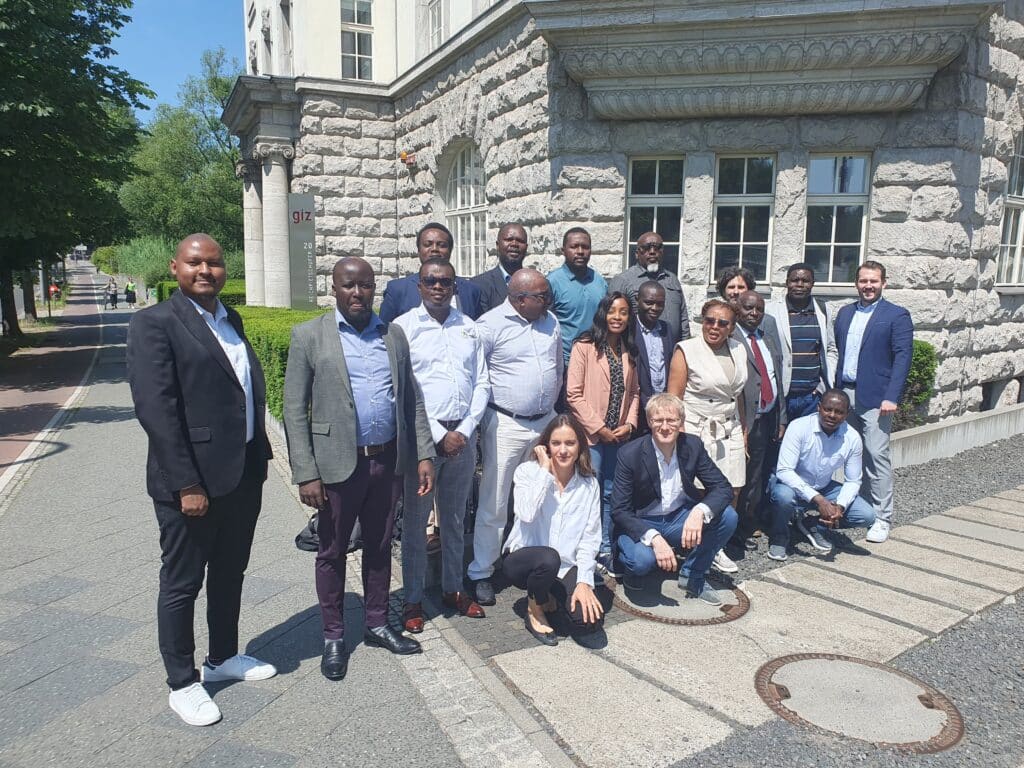
As Kenya accelerates its transition to electric mobility, developing a circular battery system is critical to ensure sustainability, affordability, and resilience. Batteries are the heart of e-mobility, but without reuse, repurposing, and recycling strategies, they risk creating environmental and economic challenges. To strengthen national capacity, a Kenyan delegation embarked on a study tour to Germany to learn from global frontrunners in circular battery systems.
From 8–14 June 2025, representatives from government, the Electric Mobility Association of Kenya (EMAK), and private sector actors participated in the Battery Circularity Study Tour, organised under the GIZ project Promotion of Electric Mobility in Kenya. The mission spanned Frankfurt, Aachen, and Berlin, combining industrial site visits, academic exchanges, and participation in the Battery Recycling Conference & Expo at E-Waste World, a premier global event.
At RWTH Aachen University and PEM Motion, delegates joined a LEGO-based simulation exercise of the battery value chain. By role-playing as raw material providers, OEMs, recyclers, or regulators, they explored system interdependencies, the importance of quality assurance, and how financing, regulation, and business ethics influence circularity. The exercise underscored that effective ecosystems depend on complete integration where “nothing is a waste.” Technical sessions at Aachen also exposed delegates to advanced battery safety testing, including nail penetration testing, and a fully functional Battery Energy Storage System (BESS) constructed from second-life Audi EV batteries. This BESS demonstrated demand-side management by charging when electricity was cheap and discharging when costs were high an innovative approach to energy cost optimisation.

At Voltfang, delegates saw first-hand how used EV batteries are repurposed into stationary storage for businesses and off-grid customers. Conversations with Voltfang leadership highlighted how policy, innovation incentives, and financing products are key enablers of circular battery markets, especially in emerging economies.
During the Battery Recycling Expo in Frankfurt, the delegates gained insights into current technologies and business models for the recycling of Li-ion batteries and the implementation of policy measures such as the EU Battery Passport. Representatives of Kenyan companies in the e-waste sector held talks with technology providers on the construction and costs of shredding plants.
In Berlin, high-level policy discussions with the Federal Environment Agency, German Federal Ministry for Economic Cooperation and Development (BMZ), German Association of the Automotive Industry (VDA) and Agora Verkehrswende explored Extended Producer Responsibility (EPR), digital battery passports, safe cross-border movement of end-of-life batteries, and opportunities for Kenya to serve as a regional hub for e-waste processing and second-life integration. Agora further stressed the potential of innovative business models such as battery-as-a-service and the need for cooperative approaches in shaping e-mobility transitions.

The delegation identified several pathways for Kenya, including:
The study tour reaffirmed Kenya’s commitment to embedding circularity into its transport transition. By linking industrial practice, policy innovation, and academic expertise, the mission offered tangible lessons to strengthen Kenya’s e-mobility ecosystem and showcased the value of international cooperation in shaping a green, inclusive battery future for Africa.
The announcement of the construction of a recycling plant for Li-ion batteries in Nairobi by the company WEEE Centre, which participated in the study tour, was made just a few weeks after the mission. It will be the first such plant in East Africa.
Promotion of Electric Mobility in Kenya is implemented by the Deutsche Gesellschaft für Internationale Zusammenarbeit (GIZ) GmbH on behalf of the German Federal Ministry for Economic Cooperation and Development (BMZ) and co-financed by European Union (EU).
 Kenya Session at the GIZ Berlin office by Michael Schuster GIZ
Kenya Session at the GIZ Berlin office by Michael Schuster GIZ

Jemimah Muli
jemimah.muli@giz.de
Visit profile

Zaria Wangeci
zaria.wangeci@giz.de
Visit profile